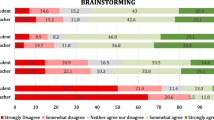Abstract
This research examined whether children with autism could be trained to improve their conversational skills and whether this led to changes in standard tests of theory of mind (ToM). Three high-functioning children with autism participated in a multiple baseline across participants design. The children were taught how to initiate a conversation, take turns during conversation, listen attentively, maintain a conversation topic, and change a conversation topic appropriately. The children were tested for ToM using False Belief tasks before and after training sessions. Results indicate that the amount of shared interest exhibited by the children with autism during conversation with their caregivers increased during training sessions. The children also made more responses that were appropriate to the context of the conversation. Performance on the False Belief tasks remained constant throughout the study. Results are discussed with respect to the implications of results of performance in standard ToM tasks.
Similar content being viewed by others
REFERENCES
American Psychiatric Association. (1987). Diagnostic and statistical manual of mental disorders (3rd ed., Rev.). Washington, DC: Author.
Antonello, S. J. (1996). Social skills development: Practical strategies for adolescents and adults with developmental disabilities. Needham Heights, MA: Allyn and Bacon.
Astington, J. W., & Jenkins, J. M. (1995). Theory of mind and social understanding. Cognition and Emotion, 9, 151-165.
Baron-Cohen, S. (1989). The autistic child's theory of mind: A case of specific developmental delay. Journal of Child Psychology and Psychiatry, 30, 385-397.
Baron-Cohen, S., Leslie, A. M., & Frith, U. (1985). Does the autistic child have a “theory of mind”? Cognition, 21, 37-46.
Bretherton, I., & Beeghly, M. (1982). Talking about internal states: The acquisition of an explicit theory of mind. Developmental Psychology, 18, 906-921.
Cartledge, G., & Kleefeld, J. (1991). Taking part: Introducing social skills to children. Circle Pines, MN: American Guidance Services.
Eisenmajor, R., & Prior, M. (1991). Cognitive linguistic correlates of “theory of mind” ability in autistic children. British Journal of Developmental Psychology, 9, 351-364.
Frith, U. (1989). Autism: Explaining the enigma. Oxford: Blackwell.
Frith, U., Happé, F., & Siddons, F. (1994). Autism and theory of mind in everyday life. Social Development, 3, 108-124.
Hadwin, J. A., Baron-Cohen, S., Howlin, P., & Hill, K. (1996). Can we teach children with autism to understand emotions, belief or pretence? Development and Psychopathology, 8, 345-365.
Hadwin, J. A., Baron-Cohen, S., Howlin, P., & Hill, K. (1997). Does teaching theory of mind have an effect on the ability to develop conversation in children with autism? Journal of Autism and Developmental Disorders, 27, 519-537.
Happé, F. G. E. (1994). An advanced test of theory of mind: Understanding of story character's thoughts and feelings by able autistic, mentally handicapped and normal children and adults. Journal of Autism and Developmental Disorders, 24, 129-154.
Hartup, W. (1975). The origins of friendship. In M. Lewis & A. Rosenblum (Eds.), Friendship and peer relations. New York: Wiley.
Holroyd, S., & Baron-Cohen, S. (1993). Brief report: How far can people with autism go in developing a theory of mind? Journal of Autism and Developmental Disorders, 23, 379-385.
Kaufman, A. S., & Kaufman, N. L. (1990). Kaufman Brief Intelligence Test. Circle Pines, MN: American Guidance Service.
Lalonde, C. E., & Chandler, M. J. (1995). False belief understanding goes to school: On the social-emotional consequences of coming early or late to a first theory of mind. Cognition and Emotion, 9, 167-185.
Lewis, M., & Rosenblum, L. (1977). Introduction. In M. Lewis & L. Fosenblum (Eds.), Friendship and peer relations. New York: Wiley.
Lord, C. (1984). Development of peer relations in children with autism. In F. Morrison, C. Lord, & D. Keating (Eds.), Applied developmental psychology (Vol. 1). New York: Academic Press.
Ozonoff, S., & Miller, J. N. (1995). Teaching theory of mind: A new approach to social skills training for individuals with autism. Journal of Autism and Developmental Disorders, 25, 415-433.
Perner, J., Frith, U., Leslie, A. M., & Leekam, S. R. (1989). Exploration of the autistic child's theory of mind: Knowledge, belief and communication. Child Development, 60, 689-700.
Prizant, B. M., & Wetherby, A. M. (1989). Enhancing language and communication in autism. In G. Dawson (Ed.), Autism, nature, diagnosis and treatment. New York: Guilford.
Ricks, D. M., & Wing, L. (1975). Language, communication and the use of symbols in normal and autistic children. Journal of Autism and Childhood Schizophrenia, 5, 191-221.
Schuler, A. L. (1980). Aspects of communication. In R. L. Schiefelbusch, M. Barket, & R. Hoyt (Eds.), Emerging language in autistic children (pp. 89-111). Baltimore: University Park Press.
Swettenham, J. S. (1996). Can children with autism be taught to understand false belief using computers? Journal of Child Psychology and Psychiatry, 37, 157-166.
Tager-Flusberg, H., & Anderson, M. (1991). The development of contingent discourse ability in autistic children. Journal of Child Psychology and Psychiatry, 32, 1123-1134.
Tager-Flusberg, H., Calkins, S., Nolin, T., Baumberger, M. A., & Chadwick-Dias, A. (1990). A longitudinal study of language acquisition in autistic and Down syndrome children. Journal of Autism and Developmental Disorders, 20, 1-21.
Author information
Authors and Affiliations
Rights and permissions
About this article
Cite this article
Chin, H.Y., Bernard-Opitz, V. Teaching Conversational Skills to Children with Autism: Effect on the Development of a Theory of Mind. J Autism Dev Disord 30, 569–583 (2000). https://doi.org/10.1023/A:1005639427185
Issue Date:
DOI: https://doi.org/10.1023/A:1005639427185




